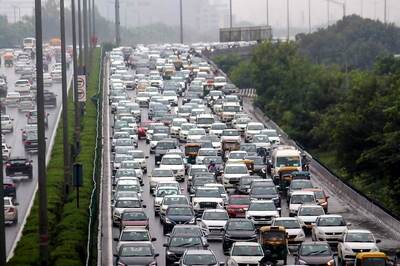
views
Tunis: Tunisians turned out in force for their country's first truly free elections on Sunday, voting that is expected to favor a long-banned Islamist party and seen as a bellwether for pro-democracy movements across the Arab world.
With soldiers keeping order, no violence was reported near the end of the voting, though authorities noted minor scattered violations. Thousands of observers monitored Tunisia's first elections since an uprising overthrew the longtime leader and set off anti-government revolts around the Middle East.
Voters - women with headscarves and without, former political prisoners, young people whose Facebook posts helped fuel the revolution in the North African country - are electing a 217-seat assembly that will appoint a new government and then write a new constitution.
Kamel Jendoubi, head of the electoral commission, said turnout was "over 60 percent and close to 70 per cent" by 4 pm (1500 GMT; 11 am EDT) on Sunday, three hours before the polls close. That was above expectations.
He told that there was no violence, but some "soft" intimidation of voters, such as street demonstrations and people continuing to campaign on voting day, which is against the rules. Some parties had received warnings, but he did not name them.
Results might not come until Monday or Tuesday. The party expected to come out on top is the moderate Islamic movement Ennahda, whose victory, especially in a comparatively secular society like Tunisia, could have wide implications for similar religious parties in the region.
Voters are definitively turning the page on the 23-year presidency of Zine El-Abidine Ben Ali, who was overthrown by a monthlong uprising on Jan. 14 stirred by anger at unemployment, corruption and repression.
The unexpected revolution in the quiet Mediterranean country - cherished by European tourists for its sandy beaches and desert oases - set off a series of similar uprisings against entrenched leaders, an event now being called the Arab Spring.
If Tunisia's elections produce an effective new government they will serve as an inspiration to pro-democracy advocates across the region, including in next-door Libya, where longtime dictator Moammar Gadhafi was killed last week by rebel forces.
"The old elections were fraudulent and this one is for our children and grandchildren so that even if I soon die, I will be happy and content," said Tayyib Awishi, 83, dressed in a crisp white robe and skull cap, in a crowded polling station in the working class Tunis suburb of Hay al-Tadammon.
At a nearby station in the same neighborhood, former political prisoner Touhami Sakouhi said he was ready to wait in line all day.
"It's a historic day, a moment of joy and celebration. Even if I have to stand in line 24 hours, I would not give up the chance to savor this air of freedom," he said.
In the more affluent Tunis suburb of al-Aouina, 18-year-old language student and former protester Zeinab Souayah said, "I'm going to grow up and think back on these days and tell my children about them."
"It feels great, it's awesome," she added, in English.
The ballot is an extra-large piece of paper bearing the names and symbols of the parties fielding a candidate in each district. The symbols are meant to aid the illiterate, estimated at about 25 percent of the population in a country with one of the most educated populations in the region.
Voters in each of the country's 33 districts, six of which are abroad, have a choice of between roughly 40 and 80 electoral lists.
It's a cacophony of choice in a country effectively under one-party rule since independence from France in 1956, and where the now-popular Islamist party Ennahda was long banned.
There are 7.5 million potential voters, though only 4.4 million of them, or just under 60 percent, are actually registered. People can vote with their identity cards but only at certain stations, which caused some confusion.
In the 10 months since the uprising, Tunisia's economy and unemployment, part of the reason for the revolution in the first place, has only become worse as tourists and foreign investors have stayed away.
Many have expressed indifference about the elections out of frustration that new jobs have yet to appear and life has not improved since the revolution.




















Comments
0 comment